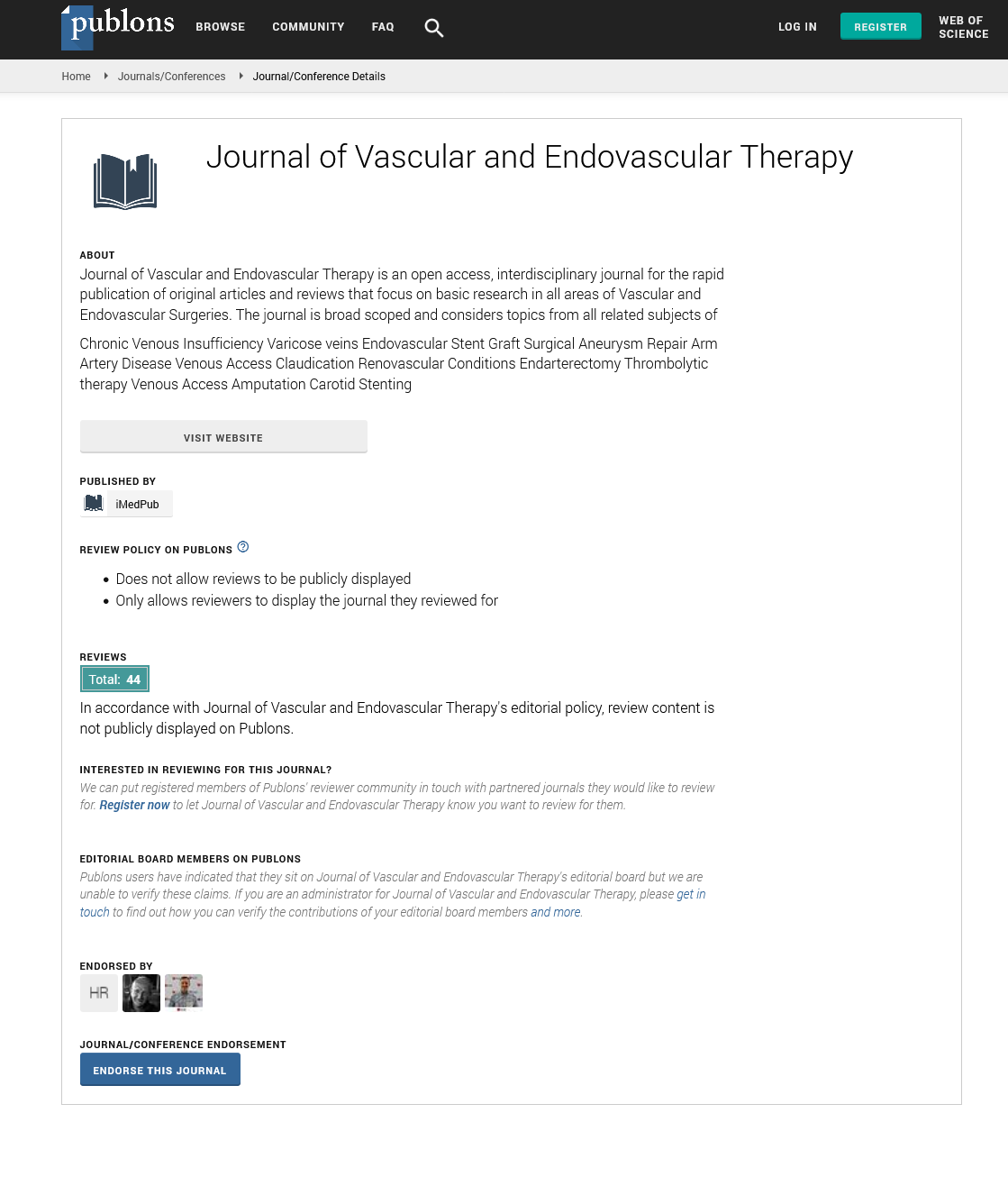ISSN : 2634-7156
Journal of Vascular and Endovascular Therapy
Venous insufficiency is the pivotal contributor in erectile dysfunction in males younger than 30 years
3rd Edition of World Congress & Exhibition on Vascular Surgery
May 24-25, 2018 London, UK
Geng Long Hsu
Hsu′s Andrology, Taiwan National Taiwan University, Taiwan
ScientificTracks Abstracts: J Vasc Endovasc Therapy
DOI: 10.21767/2573-4482-C1-002
Abstract
Erectile dysfunction (ED) concomitant with psychosis is common in adults younger than 30 years. Most cases are con-sidered entirely psychogenic in nature. Given that penile erection-related veins constitute the principal components in erectile rigidity in defrosted cadaveric he-modynamic studies; do venogenic factors dominate psychogenic factors in males with ED? Although phospho-di-esteraser-5 inhibitors have clarified current ED medi-cal treatment, resulting in a consensus on ED pathophysiology, the understanding of the erection process may yet be just at a fledgling stage. Clinically, the psychological factor plays a significant role because placebo effect affects approximately 40% of participants in clinical trials. Based on a novel penile venous anatomy and physio-logical osmolality and viscosity, an apa-gogical hemodynamic study was conducted on defrosted cadavers. Implying penile veins themselves are the most crucial fac-tors in erection physiology and that obvi-ously venogenic factors are inappropriately considered cavernosal factor in the list of ED contributors. According to our vast clinical experience, the penile venous stripping method proves to be an exclusive and naturally viable treatment option. The term young ED refers to males with ED who is younger than 40 years, whereas it strictly referred to males younger than 30 years in the three publications in our evi-dence based report. Those young ED males account for 10.3% (35/341) to 14.3% (5/35) (average, 12.1%) of the total patients with ED who underwent penile venous stripping. Erectile function is the seamless interplay of psychological and physiological health in adult males. Penile erection related veins play a principal role in erectile rigidity in cadaveric hemody-namic studies, and venoocclusive dys-function is prevalent in males with ED. However, psychological factors contribute some extent in ED and they should not be ignored during ED treatment. The role of the contribution also cannot be underesti-mated in impotence in males younger than 30 years.Recent Publications 1. Hsu G L, Chen H S, Hsieh C H, Lee W Y, Chen K L and Chang C H (2010) Clinical experience of a refined pe-nile venous surgery procedure for patients with erectile dysfunction: is it a viable op-tion? Journal of Andrology 31:271-280. 2. Hsieh C H, Liu S P, Hsu G L Chen H S, Molodysky E, Chen Y H and Yu HJ (2012) Advances in our understanding of mammalian penile evolution, human penile anatomy and human erection physiology: Clinical implications for physicians and surgeons. Medical Science Monitor 18(7):RA118-125. 3. Hsu G L, Hung Y P, Tsai M H, Hsieh C H, Chen H S, Molodysky E, Huynh C C, and Yu H J (2012) Penile veins are the principal component in erec-tile rigidity: a study of penile venous strip-ping on de-frosted human cadavers. Jour-nal of Andrology 33:1176-1185. 4. Molodysky E, Liu S P and Hsu GL (2013) Penile vascular surgery for treat-ment of erectile dysfunction: current role and future direction. Arab Journal Urology 11:254266. 5. Hsu G L, Huang Y P, Tsai M H, Chang H C, Liu S P, Molodysky E and Hsu M C Y (2013) The venous drainage of the corpora cavernosa in the human penis. Arab Journal Urology 11:384-391.
Biography
Since 1986, Geng-Long Hsu, formerly a clinical professor at China Medical University, has developed and refined a series of penile reconstructive surgeries, including penile venous surgery, corporoplasty and penile implantation, in tandem with advanced the penile anatomy and erection physiology. In 1993, he was promoted to the first Chair of Urology at Taiwan Adventist Hospital; he held that position until 1997 and then served as vice-superintendent of Po-Jen General Hospital until 2001. From 2001 to 2003, Dr. Hsu was a director of microsur-gery potency reconstruction at Taipei Medical University Hospital. Afterward, he established his private practice—Hsu’s Andrology—which serves as both a clinical practice and research center. In 2012, Dr. Hsu’s latest method of penile venous stripping, administered via an am-bulatory basis, was granted a USPTO patent. He hopes this surgery will be studied and prac-ticed worldwide.
Email:genglonghsu@gmail.com
Google Scholar citation report
Citations : 177
Journal of Vascular and Endovascular Therapy received 177 citations as per Google Scholar report
Journal of Vascular and Endovascular Therapy peer review process verified at publons
Abstracted/Indexed in
- Google Scholar
- Open J Gate
- Publons
- Geneva Foundation for Medical Education and Research
- Secret Search Engine Labs
Open Access Journals
- Aquaculture & Veterinary Science
- Chemistry & Chemical Sciences
- Clinical Sciences
- Engineering
- General Science
- Genetics & Molecular Biology
- Health Care & Nursing
- Immunology & Microbiology
- Materials Science
- Mathematics & Physics
- Medical Sciences
- Neurology & Psychiatry
- Oncology & Cancer Science
- Pharmaceutical Sciences
